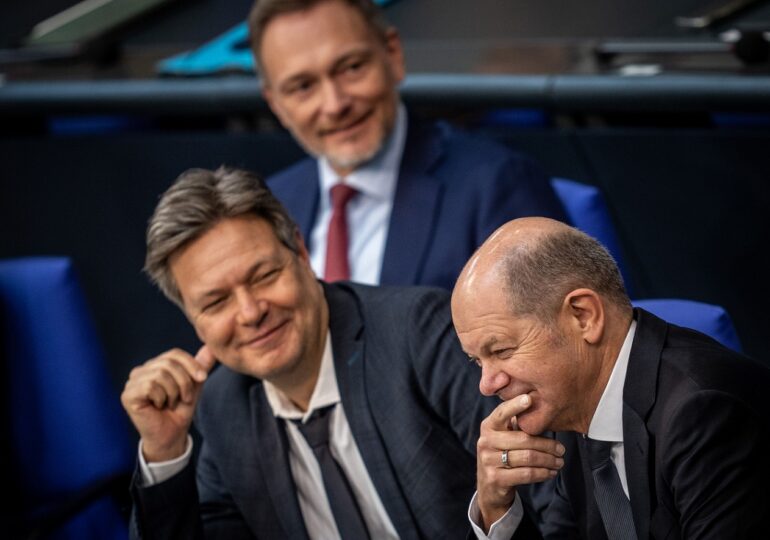Following the disastrous outcome of the European elections for the coalition led by German Chancellor Olaf Scholz, the prolonged dispute over budget approval threatens the government’s stability. The price on which its salvation depends is quite steep, but the huge stake justifies it.
If one were to bet on the survival of Olaf Scholz’s government, it would be around 40 billion euros.
According to experts, this is the estimated amount that the Chancellor and his coalition partners in power must cut from expenses to solve the budget equation for 2025, as reported by Politico.
Following the catastrophe in the European parliamentary elections recorded by the three governing coalition parties in Germany, all together barely garnering 31% of the votes, the survival of the Scholz Cabinet may hinge on the power partners' ability to agree on the budget without a major conflict.
"Either we act together now, or we let everything fall apart," said Tim Klüssendorf, a parliamentarian of the Social Democratic Party (SPD), to the publication cited.
How the Budget Became a Test of Resilience for the Coalition
There is a broad agreement within the governing parties that this coalition is severely weakened and cannot survive another protracted dispute over the budget, as happened last year when a bombshell decision by the German Supreme Court caused a 60 billion euro hole in the country's finances.
This decision limited the Government's ability to draw money from special funds established to circumvent the constitutional debt brake, which aims to limit the federal deficit to 0.35% of GDP, except in emergency situations.
The ramifications of this decision continue to haunt the governing coalition, forcing its parties to take measures to cut the scheduled expenses for 2025.
The Minister of Economy, Robert Habeck, the Minister of Finance, Christian Lindner, and Chancellor Scholz must present the budget proposal by the beginning of July, before the parliamentary recess.
As the coalition emerged battered from the European elections, and opposition conservative leaders are calling for early elections, the political future of the governing parties largely depends on their ability to reach an agreement on the budget. But there are several issues here.
Finding an agreement that satisfies everyone seems a distant possibility, given the desperate political priorities within the coalition. Left-wing members of the governing parties - SPD and Greens - firmly oppose cutting social programs and are in favor of relaxing strict spending rules, while Free Democrats want to adhere to strict rules.
Furthermore, the political weakness of the parties means that factions are likely to double down on their core - and often contradictory - policy priorities in an attempt to gather support bases.
As it stands, the governing parties have very little room for fiscal maneuver in a budget projected to total around 450 billion euros for 2025.
"Almost half of the federal budget is ultimately earmarked for social spending and pensions, which means that the possibility of reducing expenses is very limited," said Moritz Schularick, President of the Kiel Institute for the World Economy. Reductions of tens of billions would be impossible without cutting social expenses, he added.
However, members of Scholz's party, the SPD, have warned that they will not accept these cuts. "An austerity budget at the expense of social cohesion in the country is not possible and will not happen," said Kevin Kühnert, the SPD's General Secretary, to reporters earlier this month.
A budget agreement, he added, represents "a short-term test to determine if the coalition can still work together." "What greater urgency could there be?" he added.
Nerves, Misunderstandings, and a Huge Stake
A major point of contention involves defense and how the funds will be found to pay for Scholz's promises to rebuild the German army and meet the NATO spending target of 2% of GDP each year in the future.
Defense Minister Boris Pistorius stated that around 6.5 billion euros in additional military spending will be needed in 2025 to fulfill the Government's defense commitments. To finance these promises, he proposed paying for defense expenses with a special fund outside Germany's normal budget, arguing that German citizens have a constitutional right to security.
Green Party Foreign Minister Annalena Baerbock argues that Russia's invasion of Ukraine constitutes an emergency, justifying a suspension of the debt brake to fund military expenses and support for Kiev. "What greater urgency could there be than this war in the middle of Europe? It would be fatal to say in a few years: we saved the debt brake, but we lost Ukraine," she argued in an interview with the German newspaper Süddeutsche Zeitung.
However, Free Democratic Party Finance Minister Christian Lindner rejected the idea - defense spending should not come from a special fund, he believes. Lindner and his party members have criticized attempts to circumvent or reform the debt brake.
"It annoys me that the SPD never misses an opportunity to repeatedly question compliance with the debt brake. Abolishing it would require a two-thirds majority in parliament, which will not happen," said FDP parliamentarian Claudia Raffelhüschen to Politico, who is part of the budget and finance committees.
The unequivocal terms in which Raffelhüschen expressed herself highlight the misunderstandings within the coalition. But despite the seemingly irresolvable conflict, party leaders say they will avoid a prolonged quarrel that will only fuel calls for early elections - as in the case of France. This is the real stake of the budget agreement in Germany.
"The greatest favor we could do to the enemies of liberal democracy at home and abroad would be for another European democracy to go to early elections," said Annalena Baerbock.
T.D.

